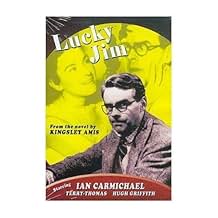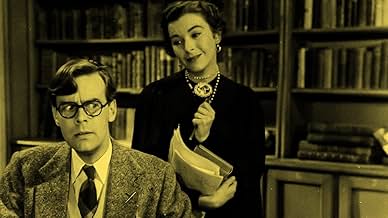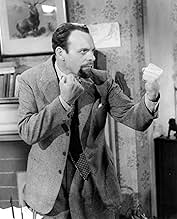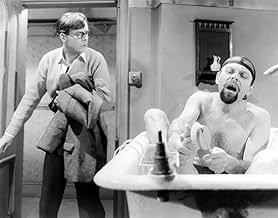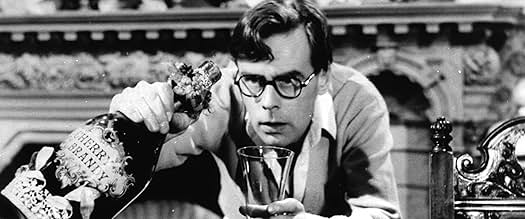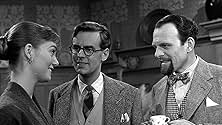IMDb RATING
5.9/10
798
YOUR RATING
Jim Dixon struggles with university work, Professor Welch's boring behavior, and his neurotic friend Margaret Peel. His misery is further complicated by his son Bertrand and companion Christ... Read allJim Dixon struggles with university work, Professor Welch's boring behavior, and his neurotic friend Margaret Peel. His misery is further complicated by his son Bertrand and companion Christine Callaghan.Jim Dixon struggles with university work, Professor Welch's boring behavior, and his neurotic friend Margaret Peel. His misery is further complicated by his son Bertrand and companion Christine Callaghan.
- Director
- Writers
- Stars
John Welsh
- The Principal
- (as John Welch)
Henry B. Longhurst
- Professor Hutchinson
- (as Henry Longhurst)
- Director
- Writers
- All cast & crew
- Production, box office & more at IMDbPro
Featured reviews
Kingsley Amis's first and best novel drew much satirical thrust from its evocation of the late 1940s, when British idealism about the socialist government elected in the first flush of World War Two victory was petering out. The ex-communist university lecturer Amis's ambiguity about putting The People in charge- later expressed in a vehement rejection of educational egalitarianism- is already implicit in this campus chronicle.
The Boulting Brothers, themselves on the left, worked "Lucky Jim" into the mildly satirical cycle of movies which made them the main successors to Ealing in the 1950s and early 1960s. But by updating it to the present and filling it with their rep company of character actors, they lost the plot.
Written by the newspaper humorist Patrick Campbell, this picturisation skates over the hypocrisy of Professor Welch and his clan as moneyed leftists-- an early depiction of limousine liberalism-- and concentrates on slapstick. Ian Carmichael, whose northern accent comes and goes, is too posh to play a grammar school lad who has blundered into the wrong profession. Terry-Thomas is too old and too T-T ("extra-ordinary fellah!") for Bertrand Welch, the spoilt son-- and why make him a novelist rather than a painter, when visual fun could have been had with his awful daubs to make up for the absence of Amis's authorial voice?
Most of the novel's heft comes from the gap between Jim Dixon's forced toadying and his secret derision, expressed in making faces and fantasising elaborate practical jokes. Little of this can get through in a script which majors on pratfalls and all-too-Britishly endorses Jim as the good guy by having the Welch's dog adopt him. And the provincial campus is too grand for the era of austerity and demobbed students Amis imagined, as though the Boultings secretly hankered to relocate the tale to Oxbridge.
All that said, there are incidental pleasures. Hugh Griffiths is spot-on as "Neddy" Welch, as is his namesake Kenneth as the creepy Evan Johns. Unexpectedly, given the initial compromises, the denouement (which was slapstick in the book too) gets closer to Amis's acrid eloquence, although drunks on screen become tiresome faster than directors realise. Interestingly in view of Amis's later problems with American publishers, the Boultings tone down the novel's misogyny. Margaret Peel is less neurotic, predatory and manipulative in the film. Jim's love object Christine, alas, is a tittering cipher on both page and screen. The British cinema wasn't doing sex in the Fifties unless it was "exposing" tarts in Soho.
The Boulting Brothers, themselves on the left, worked "Lucky Jim" into the mildly satirical cycle of movies which made them the main successors to Ealing in the 1950s and early 1960s. But by updating it to the present and filling it with their rep company of character actors, they lost the plot.
Written by the newspaper humorist Patrick Campbell, this picturisation skates over the hypocrisy of Professor Welch and his clan as moneyed leftists-- an early depiction of limousine liberalism-- and concentrates on slapstick. Ian Carmichael, whose northern accent comes and goes, is too posh to play a grammar school lad who has blundered into the wrong profession. Terry-Thomas is too old and too T-T ("extra-ordinary fellah!") for Bertrand Welch, the spoilt son-- and why make him a novelist rather than a painter, when visual fun could have been had with his awful daubs to make up for the absence of Amis's authorial voice?
Most of the novel's heft comes from the gap between Jim Dixon's forced toadying and his secret derision, expressed in making faces and fantasising elaborate practical jokes. Little of this can get through in a script which majors on pratfalls and all-too-Britishly endorses Jim as the good guy by having the Welch's dog adopt him. And the provincial campus is too grand for the era of austerity and demobbed students Amis imagined, as though the Boultings secretly hankered to relocate the tale to Oxbridge.
All that said, there are incidental pleasures. Hugh Griffiths is spot-on as "Neddy" Welch, as is his namesake Kenneth as the creepy Evan Johns. Unexpectedly, given the initial compromises, the denouement (which was slapstick in the book too) gets closer to Amis's acrid eloquence, although drunks on screen become tiresome faster than directors realise. Interestingly in view of Amis's later problems with American publishers, the Boultings tone down the novel's misogyny. Margaret Peel is less neurotic, predatory and manipulative in the film. Jim's love object Christine, alas, is a tittering cipher on both page and screen. The British cinema wasn't doing sex in the Fifties unless it was "exposing" tarts in Soho.
Lucky Jim is directed by John Boulting and adapted from the Kingsley Amis novel of the same name. It stars Ian Carmichael, Terry-Thomas, Hugh Griffith, Sharon Acker and Jean Anderson.
A Redbrick university In Britain's New Elizabethan Age: Here Are Moulded The Intellectual Drakes And Raleighs Of Tomorrow-Fearless, Independent- -
And State Supported!
Enter Carmichael's accident prone Jim Dixon, who in order to keep his job at the University has to do the bidding for Griffith's dull Professor Welch. Worse still, maybe, is having to spend time with his boorish family, especially the Son, pompous show off Bertrand (Thomas). Salvation may come in the form of Bertrand's companion, though, Christine Callaghan (Acker)?
I haven't read the Amis novel this is based on, so can't have frame of reference there. By all accounts it's very different, and staunch Amis supporters are very dismissive of the Boulting movie. The film itself is hardly prime Boullting Brothers, who would produce British classics such as Brighton Rock and I'm All Right Jack, but it has a number of funny scenes whilst also being nicely flecked with satirical flavouring. Carmichael attacks the lead role with gusto and comic affability, while "scary eyebrows" Griffith and Terry-Thomas provide good comedy footings for Carmichael to work from. The ladies are pretty and effective enough, without really doing anything any other British actress of the time couldn't have done, but all told it's a well acted and genial time filler for the undemanding. 6.5/10
A Redbrick university In Britain's New Elizabethan Age: Here Are Moulded The Intellectual Drakes And Raleighs Of Tomorrow-Fearless, Independent- -
And State Supported!
Enter Carmichael's accident prone Jim Dixon, who in order to keep his job at the University has to do the bidding for Griffith's dull Professor Welch. Worse still, maybe, is having to spend time with his boorish family, especially the Son, pompous show off Bertrand (Thomas). Salvation may come in the form of Bertrand's companion, though, Christine Callaghan (Acker)?
I haven't read the Amis novel this is based on, so can't have frame of reference there. By all accounts it's very different, and staunch Amis supporters are very dismissive of the Boulting movie. The film itself is hardly prime Boullting Brothers, who would produce British classics such as Brighton Rock and I'm All Right Jack, but it has a number of funny scenes whilst also being nicely flecked with satirical flavouring. Carmichael attacks the lead role with gusto and comic affability, while "scary eyebrows" Griffith and Terry-Thomas provide good comedy footings for Carmichael to work from. The ladies are pretty and effective enough, without really doing anything any other British actress of the time couldn't have done, but all told it's a well acted and genial time filler for the undemanding. 6.5/10
It's hard for me to be objective about this film, as it is adapted from my favorite novel--which I've read eight or nine times. Also, I waited so long to see it that it may have been inevitable that I would ultimately be disappointed. Ironically, I first heard about the film some years before I read the book, and it was only after I read the book that I made the connection between it and the description my brother had once given me. It would be about 20 years (no kidding!) before I finally saw the film myself. I've now seen it twice and mostly hated it both times.
Kingsley Amis's LUCKY JIM was obligatory reading among history students when I was in grad school 30 years ago. The story about an unhappy history instructor in a crummy British provincial university expressed a lot of the angst that we felt as grad students, and it was funnier than heck as well. I loved the book then, and still love all these years later. Why, then, was the film such a disappointment? Mainly because the script muted much of the savageness of Amis's humor, and because it tacked on an idiotic chase scene at the end that has nothing whatever to do with the original story--or even with what goes before it in the film. (Even Ian Carmichael--who played Jim--hated that ending. He told me that the people making the film didn't seem to have any idea of what they were doing--and it shows.)
The producers also added a very unsatisfactory and irrelevant academic procession in them middle of the film--evidently for the sole purpose of making Carmichael look like a klutz by having him tripping over flowerpots and dropping things in the middle of the solemn affair.
Nevertheless, the film does have its virtues, chief among them is excellent casting. Ian Carmichael was born to play Jim. Terry-Thomas was properly unctuous as Bertrand; Hugh Griffith certainly looked the part as Professor Neddy; Maureen Connell looked like I imagined the neurotic Margaret Peel; and Sharon Acker made a fine-looking Christine Callaghan.
Kingsley Amis's LUCKY JIM was obligatory reading among history students when I was in grad school 30 years ago. The story about an unhappy history instructor in a crummy British provincial university expressed a lot of the angst that we felt as grad students, and it was funnier than heck as well. I loved the book then, and still love all these years later. Why, then, was the film such a disappointment? Mainly because the script muted much of the savageness of Amis's humor, and because it tacked on an idiotic chase scene at the end that has nothing whatever to do with the original story--or even with what goes before it in the film. (Even Ian Carmichael--who played Jim--hated that ending. He told me that the people making the film didn't seem to have any idea of what they were doing--and it shows.)
The producers also added a very unsatisfactory and irrelevant academic procession in them middle of the film--evidently for the sole purpose of making Carmichael look like a klutz by having him tripping over flowerpots and dropping things in the middle of the solemn affair.
Nevertheless, the film does have its virtues, chief among them is excellent casting. Ian Carmichael was born to play Jim. Terry-Thomas was properly unctuous as Bertrand; Hugh Griffith certainly looked the part as Professor Neddy; Maureen Connell looked like I imagined the neurotic Margaret Peel; and Sharon Acker made a fine-looking Christine Callaghan.
Jim Dixon is a junior lecturer at an unnamed provincial university. Kingsley Amis, who wrote the novel on which this film is based, took his title from a song- "Oh, lucky Jim, How I envy him..." (We hear this song a couple of times during the film). As the story opens, however, Jim does not seem to be particularly lucky or enviable. Indeed, his life can be summed up in the words of the theme-song from "Friends":-
"Your job's a joke, you're broke, your love life's D. O. A."
He hates his job and his boss, Professor Welch. He is perpetually short of cash and forced to live in a seedy lodging-house. His relationship with his possessive, needy girlfriend Margaret appears to be going nowhere and, while he has set his cap at an attractive blonde named Christine, that relationship also appears to be doomed as she is the girlfriend of Welch's novelist son Bertrand.
The novel has long been a favourite of mine, but I have never had the same affection for the film version, largely because the film-makers never manage to find an equivalent for Amis's bitingly satirical authorial voice. Scenes which are brilliantly funny in the book, such as Professor Welch's disastrous musical weekend, in the course of which Jim manages to set fire to his bed, or the one in which Jim delivers a lecture while drunk, never come to life in the same way on the screen. The scriptwriters also include some episodes of slapstick humour not found in the book, such as Jim's attempt to organise the floral decorations at an academic ceremony or the chase scene at the end, but these are no substitute for Amis's savage wit.
Ian Carmichael was later to gain a reputation for playing upper-class characters such as Bertie Wooster or the aristocratic detective Lord Peter Wimsey, but in 1957 these productions still lay in the future. Even so he still seems a bit too posh for Jim, who is supposed to be a working-class Northerner, as well as a bit too old at 37. This means that the question of social class, an important theme in the novel, is rather avoided in the film. Contrary to what one reviewer writes, Amis, who in 1954 still considered himself to be on the Left, was not using "Lucky Jim" to satirise well-heeled bourgeois Leftists. (Later, when he had moved sharply to the Right, he was to lay into radical-chic champagne socialists with gusto in novels like "Girl, 20" from 1971). Professor Welch, with his romantic fantasies of some pre-modern pre-industrial "Merrie England", is a nostalgia-obsessed cultural conservative, and Bertrand probably a political one.
The Jim of the novel is in many ways a flawed character. For one who hopes to make a living by teaching history, he displays a surprising lack of enthusiasm for his subject. He drinks too much, often treats Margaret badly and can be rude and tactless. He devotes a lot of energy to pursuing feuds against those who annoy him and can be oddly childish. The character in the film is very much watered down in an attempt to make him more likeable; this attempt succeeds to some extent, but at the cost of also making him less interesting.
Maureen Connell's Margaret is less neurotic, hysterical and manipulative here than she is in the book, and as a result becomes completely forgettable. Sharon Acker's Christine is almost equally so. (Christine was English in the book but here becomes Canadian, possibly in order to make the film more marketable in North America). Those characters in the film who do stand out tend to be those who are played in the same way as they are in the novel, notably Hugh Griffith's absent-minded, evasive, pedantic and pretentious Professor Welch and Terry-Thomas's pompous, self-important, snobbish and bullying Bertrand. (Like Carmichael, however, Terry-Thomas at 46 was really too old. He was actually a year older than Griffith who plays his father).
The film is not altogether a bad one and can provide a few amusing moments. When one considers how good its source novel is, however, it really should have been a lot better. 6/10.
"Your job's a joke, you're broke, your love life's D. O. A."
He hates his job and his boss, Professor Welch. He is perpetually short of cash and forced to live in a seedy lodging-house. His relationship with his possessive, needy girlfriend Margaret appears to be going nowhere and, while he has set his cap at an attractive blonde named Christine, that relationship also appears to be doomed as she is the girlfriend of Welch's novelist son Bertrand.
The novel has long been a favourite of mine, but I have never had the same affection for the film version, largely because the film-makers never manage to find an equivalent for Amis's bitingly satirical authorial voice. Scenes which are brilliantly funny in the book, such as Professor Welch's disastrous musical weekend, in the course of which Jim manages to set fire to his bed, or the one in which Jim delivers a lecture while drunk, never come to life in the same way on the screen. The scriptwriters also include some episodes of slapstick humour not found in the book, such as Jim's attempt to organise the floral decorations at an academic ceremony or the chase scene at the end, but these are no substitute for Amis's savage wit.
Ian Carmichael was later to gain a reputation for playing upper-class characters such as Bertie Wooster or the aristocratic detective Lord Peter Wimsey, but in 1957 these productions still lay in the future. Even so he still seems a bit too posh for Jim, who is supposed to be a working-class Northerner, as well as a bit too old at 37. This means that the question of social class, an important theme in the novel, is rather avoided in the film. Contrary to what one reviewer writes, Amis, who in 1954 still considered himself to be on the Left, was not using "Lucky Jim" to satirise well-heeled bourgeois Leftists. (Later, when he had moved sharply to the Right, he was to lay into radical-chic champagne socialists with gusto in novels like "Girl, 20" from 1971). Professor Welch, with his romantic fantasies of some pre-modern pre-industrial "Merrie England", is a nostalgia-obsessed cultural conservative, and Bertrand probably a political one.
The Jim of the novel is in many ways a flawed character. For one who hopes to make a living by teaching history, he displays a surprising lack of enthusiasm for his subject. He drinks too much, often treats Margaret badly and can be rude and tactless. He devotes a lot of energy to pursuing feuds against those who annoy him and can be oddly childish. The character in the film is very much watered down in an attempt to make him more likeable; this attempt succeeds to some extent, but at the cost of also making him less interesting.
Maureen Connell's Margaret is less neurotic, hysterical and manipulative here than she is in the book, and as a result becomes completely forgettable. Sharon Acker's Christine is almost equally so. (Christine was English in the book but here becomes Canadian, possibly in order to make the film more marketable in North America). Those characters in the film who do stand out tend to be those who are played in the same way as they are in the novel, notably Hugh Griffith's absent-minded, evasive, pedantic and pretentious Professor Welch and Terry-Thomas's pompous, self-important, snobbish and bullying Bertrand. (Like Carmichael, however, Terry-Thomas at 46 was really too old. He was actually a year older than Griffith who plays his father).
The film is not altogether a bad one and can provide a few amusing moments. When one considers how good its source novel is, however, it really should have been a lot better. 6/10.
I don't think this 1950's Boulting Brothers comedy dramatisation of Kingsley Amis's novel has aged well. It purports to mock upper-class academia of the time through the vessel of Ian Carmichael's title character (cue madrigal singers) as he gently rocks up against his so-called superiors and betters and supposedly knocks them down a peg or two with his freshness, unconventionality and honesty. It's funny how in so doing he comes off himself as a rather eccentric upper-class toff, one who you believe could still end up as one of the stuffy establishment figures he's presumably meant to contrast with.
It doesn't help that Carmichael is much too old in the part. The Angry Young Men were starting to make waves in British theatre and cinema at the time but here all we get a mildly querulous, getting-on-somewhat man blundering and blustering from one unlikely situation to another. The three main comedic set-pieces of Jim (cue madrigal singers) playing in an impromptu musical gathering at his college superior's house, disastrously arranging the floral display of the university procession to be attended by the new college chancellor and lastly his drunkenly irreverent speech on the designated theme of "Merrie England" in front of the assembled pupils and masters all fall flat with the only time I was remotely amused being when in his drunken state he predictably finds himself in the bedroom of his torch-carrying old-maid admirer and proceeds to shoot over the proverbial open goal. Somehow, in all this, he still gets the pretty young girl although the fact that his competition is Terry Thomas in an unsympathetically written-part makes that a foregone conclusion almost from their first meeting.
I see that contemporary critics compared Carmichael's performance as Jim (cue madrigal singers) with that of Jerry Lewis which somehow manages to insult them both. No one else in the cast stood out for me either although they were none of them helped by the dull screenplay and stodgy direction. If this is what passed for rebelliousness in late 50's British cinema, I can only say I'm glad that the so-called kitchen sink dramas with genuinely vibrant young talent like Finney, Harvey, Bates and Courteney were just around the corner.
Oh and those madrigal singers will infuriate you with every chorus!
It doesn't help that Carmichael is much too old in the part. The Angry Young Men were starting to make waves in British theatre and cinema at the time but here all we get a mildly querulous, getting-on-somewhat man blundering and blustering from one unlikely situation to another. The three main comedic set-pieces of Jim (cue madrigal singers) playing in an impromptu musical gathering at his college superior's house, disastrously arranging the floral display of the university procession to be attended by the new college chancellor and lastly his drunkenly irreverent speech on the designated theme of "Merrie England" in front of the assembled pupils and masters all fall flat with the only time I was remotely amused being when in his drunken state he predictably finds himself in the bedroom of his torch-carrying old-maid admirer and proceeds to shoot over the proverbial open goal. Somehow, in all this, he still gets the pretty young girl although the fact that his competition is Terry Thomas in an unsympathetically written-part makes that a foregone conclusion almost from their first meeting.
I see that contemporary critics compared Carmichael's performance as Jim (cue madrigal singers) with that of Jerry Lewis which somehow manages to insult them both. No one else in the cast stood out for me either although they were none of them helped by the dull screenplay and stodgy direction. If this is what passed for rebelliousness in late 50's British cinema, I can only say I'm glad that the so-called kitchen sink dramas with genuinely vibrant young talent like Finney, Harvey, Bates and Courteney were just around the corner.
Oh and those madrigal singers will infuriate you with every chorus!
Did you know
- TriviaAt 46 Terry-Thomas was a year older than Hugh Griffith, who played his father. Jean Anderson, playing his mother, was only 4 years older than Thomas.
- GoofsThe taxi used by Jim and Christine when leaving the ball has 'Taxi' on a paper sign in the windscreen which is not there in long shot.
- Crazy creditsOpening credits prologue: A Redbrick University in Britain's new Elizabethan age: here are moulded the intellectual Drakes and Raleighs of tomorrow - fearless, independent - and state supported
- ConnectionsReferenced in The Bill: Lucky Jim (1999)
- How long is Lucky Jim?Powered by Alexa
Details
- Release date
- Country of origin
- Language
- Also known as
- Lucky Jim
- Filming locations
- The Royal Masonic School, Bushey, Hertfordshire, England, UK(red-brick university where Jim works)
- Production companies
- See more company credits at IMDbPro
- Runtime1 hour 35 minutes
- Color
Contribute to this page
Suggest an edit or add missing content

Top Gap
By what name was Sept jours de malheur (1957) officially released in Canada in English?
Answer
